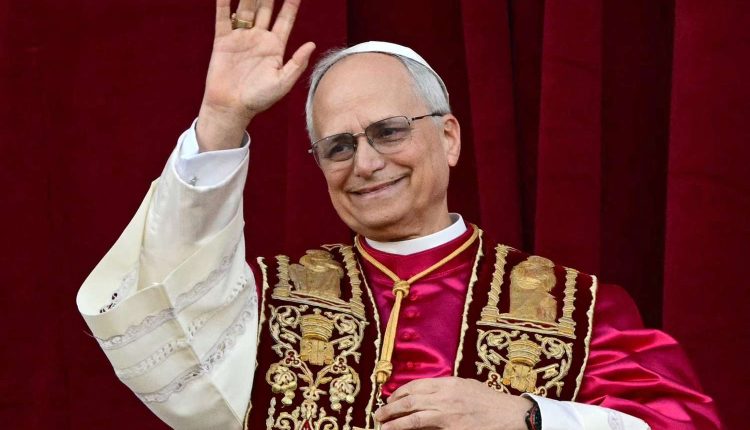BREAKING: Pope Leo Ascends The Throne Of St Peter

The election of Cardinal Robert Francis Prevost as Pope Leo XIV – the first American Pope in Catholic history – marks a historic moment that heralds a papacy that will be tested by the world’s most complex challenges.
At 69, the Chicago-born pontiff inherits a Church grappling with deep divisions, global conflicts, moral questions posed by technological advancement, and the urgent need to remain relevant to over 1.4 billion Catholics worldwide. The tasks before him are monumental, and the expectations could hardly be higher.
President Bola Tinubu’s congratulatory message aptly captures the global sentiment surrounding Pope Leo XIV’s election. The President felicitated the Conclave for electing the American prelate as the 267th Bishop of Rome, noting that his message of faith and hope already resonates across the globe.
President Tinubu’s observation that the Pope’s election “opens a new chapter in the history of the Catholic Church” reflects the international community’s anticipation of transformative leadership.
The new pontiff brings unique qualifications to his role. His nine documented visits to Nigeria over 15 years demonstrate a deep understanding of African Catholic communities and developing world challenges.
This familiarity with diverse global contexts will prove crucial as he navigates the complex landscape of modern Catholicism. His background as Prior General of the Augustinian Order, his decade of missionary work in Peru, and his recent role as Prefect of the Dicastery for Bishops have prepared him for the institutional challenges ahead.
Pope Leo XIV’s choice of name makes a bold statement about his intended direction. Pope Leo XIII (1878-1903) was known for championing workers’ rights and Catholic social doctrine, setting a precedent that suggests the new pontiff will prioritise social justice and economic equality.
This alignment with his predecessor Pope Francis’s focus on the poor and marginalised signals continuity in papal priorities, even as the Church expects Pope Leo to lead “as his own man.”
The immediate challenges confronting Pope Leo XIV are staggering. Global conflicts rage from Ukraine to the Middle East, creating a humanitarian crisis that demands moral leadership. His recent offer to mediate between warring nations – declaring that he “will make every effort so that this peace may prevail” – sets the tone for an activist papacy.
However, translating such noble intentions into tangible diplomatic outcomes will require navigating complex geopolitical realities that have confounded secular leaders for decades.
The internal challenges within the Catholic Church are equally daunting. Pope Leo XIV inherits deep ideological divisions between progressive and conservative factions that threatened to fracture the Church during previous papacies.
His success in obtaining the required two-thirds majority from the College of Cardinals suggests broad appeal, but maintaining unity while implementing reforms will test his diplomatic skills.
Questions about the role of women in the Church, the exercise of hierarchical power, and the movement toward a more inclusive global Church remain contentious issues requiring delicate handling.
His progressive stance on social issues like migration and poverty, contrasted with his more moderate positions on traditional Catholic doctrine, reflects the delicate balance he must maintain.
The Pope’s background in mathematics from Villanova University and his theological training from the Catholic Theological Union of Chicago suggest intellectual rigour that will serve him well in addressing complex modern challenges. His fluency in Spanish and Italian, demonstrated in his first public address, enables direct communication with diverse global Catholic communities.
Pope Leo XIV’s emphasis on continuing the reforms of the Second Vatican Council while addressing contemporary realities suggests a progressive agenda. His pledge of “complete commitment” to Vatican II’s teachings indicates determination to modernise Church practices while maintaining doctrinal foundations.
This balancing act between tradition and progress will define his papacy’s success.
The international community watches closely as Pope Leo XIV assumes leadership during a period of global crisis. His call for leaders to “meet, talk, and negotiate” reflects diplomatic instincts that could prove valuable in international mediation efforts.
However, the gap between moral authority and political influence remains significant, requiring careful navigation of diplomatic protocols and sovereign sensitivities.
His missionary background and identification as someone who still considers himself “a missionary” suggests a papacy that will actively engage with the world rather than retreat into Vatican isolation.
The challenge of maintaining Church unity while implementing reforms cannot be understated. Previous efforts at modernisation have sometimes resulted in conservative backlash. Pope Leo XIV must demonstrate that progressive leadership can coexist with institutional stability.
As Pope Leo XIV begins his papacy, the world awaits evidence of his leadership mettle. The coming months will reveal whether his diplomatic approach, intellectual capacity, and moral authority can address the enormous challenges facing the Catholic Church and the broader world.
The test of Pope Leo XIV’s papacy lies not in his intentions but in his ability to translate vision into action, to build bridges without compromising principles, and to lead a global institution toward relevance in an increasingly complex world.
History will judge whether he rises to meet these extraordinary challenges or becomes another well-intentioned pontiff overwhelmed by the weight of global expectations. The world watches, and the Catholic faithful pray, as the great test of his papacy begins.
